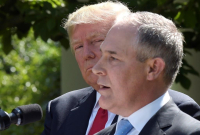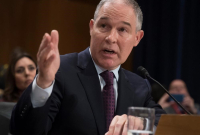Support strong Canadian climate journalism for 2025
The head of the Environmental Protection Agency said Tuesday he intends to replace the outside experts that advise him on science and public health issues with new board members holding more diverse views.
In announcing the changes, EPA Administrator Scott Pruitt suggested many previously appointed to the panels were potentially biased because they had received federal research grants. The 22 boards advise EPA on a wide range of issues, including drinking water standards and pesticide safety.
"Whatever science comes out of EPA shouldn't be political science," said Pruitt, a Republican lawyer who previously served as the attorney general of Oklahoma. "From this day forward, EPA advisory committee members will be financially independent from the agency."
Pruitt has expressed skepticism about the consensus of climate scientists that man-made carbon emissions are the primary cause of global warming. He also overruled experts that had recommended pulling a top-selling pesticide from the market after peer-reviewed studies showed it damaged children's brains.
Pruitt said he will name new leadership and members to three key EPA advisory boards soon — the Science Advisory Board, Clean Air Scientific Advisory Committee, and the Board of Scientific Counselors.
It was not clear from the EPA's media release if all current board members serving out their appointed terms were immediately dismissed. EPA's press office did not respond to messages seeking clarification on Tuesday.
As part of his directive, Pruitt said he will bar appointees who currently are in receipt of EPA grants or who are in a position to benefit such grants. He exempted people who work at state, local or tribal agencies, saying he wants to introduce more "geographic diversity" to the panels.
The five-page policy Pruitt issued Tuesday makes no mention of other potential conflicts of interest, such as accepting research funding from corporate interests regulated by EPA.
Tuesday's announcement comes after Pruitt in May said he would not reappoint nine of the 18 members of the Board of Scientific Counselors to serve a second three-year term, as had been customary.
Current board chairwoman Deborah Swackhamer said the members were already required to follow rules intended to prevent conflicts of interests.
"It obviously stacks the deck against scientists who do not represent corporate special interests," said Swackhamer, a retired professor who taught environmental health sciences at the University of Minnesota. "It speaks volumes that people funded by special interests are OK to be advisers, but not those who have received federal grants."
Senate Environment Committee Chairman John Barrasso, a Wyoming Republican who shares Pruitt's skepticism of mainstream climate science, cheered the move. He said EPA's science boards would now better reflect the views of rural states like his own.
But environmentalists worried that Pruitt will now select board members with financial ties to the fossil fuel and chemical industries.
"The Trump EPA's continued attack on science will likely be one of the most lasting and damaging legacies of this administration," said Sen. Tom Udall of New Mexico, the ranking Democrat on the appropriations subcommittee that approves EPA's funding. "Pruitt is purging expert scientists from his science boards — and replacing them with mouthpieces for big polluters."
The Associated Press





Comments